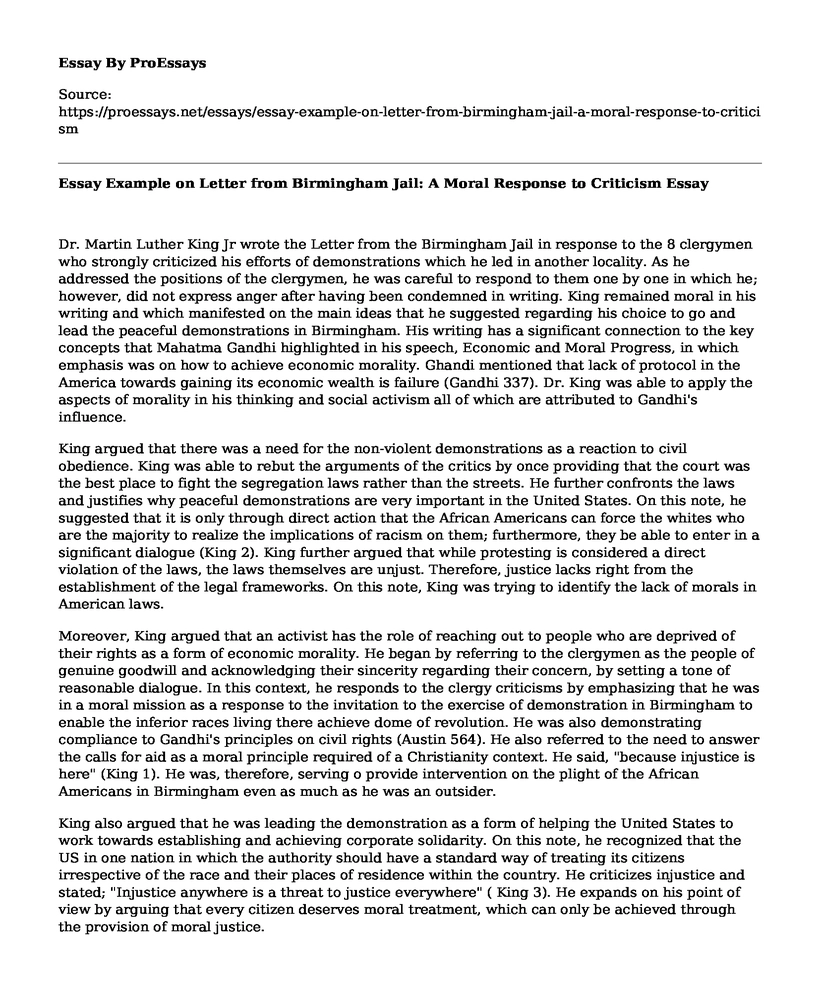Dr. Martin Luther King Jr wrote the Letter from the Birmingham Jail in response to the 8 clergymen who strongly criticized his efforts of demonstrations which he led in another locality. As he addressed the positions of the clergymen, he was careful to respond to them one by one in which he; however, did not express anger after having been condemned in writing. King remained moral in his writing and which manifested on the main ideas that he suggested regarding his choice to go and lead the peaceful demonstrations in Birmingham. His writing has a significant connection to the key concepts that Mahatma Gandhi highlighted in his speech, Economic and Moral Progress, in which emphasis was on how to achieve economic morality. Ghandi mentioned that lack of protocol in the America towards gaining its economic wealth is failure (Gandhi 337). Dr. King was able to apply the aspects of morality in his thinking and social activism all of which are attributed to Gandhi's influence.
King argued that there was a need for the non-violent demonstrations as a reaction to civil obedience. King was able to rebut the arguments of the critics by once providing that the court was the best place to fight the segregation laws rather than the streets. He further confronts the laws and justifies why peaceful demonstrations are very important in the United States. On this note, he suggested that it is only through direct action that the African Americans can force the whites who are the majority to realize the implications of racism on them; furthermore, they be able to enter in a significant dialogue (King 2). King further argued that while protesting is considered a direct violation of the laws, the laws themselves are unjust. Therefore, justice lacks right from the establishment of the legal frameworks. On this note, King was trying to identify the lack of morals in American laws.
Moreover, King argued that an activist has the role of reaching out to people who are deprived of their rights as a form of economic morality. He began by referring to the clergymen as the people of genuine goodwill and acknowledging their sincerity regarding their concern, by setting a tone of reasonable dialogue. In this context, he responds to the clergy criticisms by emphasizing that he was in a moral mission as a response to the invitation to the exercise of demonstration in Birmingham to enable the inferior races living there achieve dome of revolution. He was also demonstrating compliance to Gandhi's principles on civil rights (Austin 564). He also referred to the need to answer the calls for aid as a moral principle required of a Christianity context. He said, "because injustice is here" (King 1). He was, therefore, serving o provide intervention on the plight of the African Americans in Birmingham even as much as he was an outsider.
King also argued that he was leading the demonstration as a form of helping the United States to work towards establishing and achieving corporate solidarity. On this note, he recognized that the US in one nation in which the authority should have a standard way of treating its citizens irrespective of the race and their places of residence within the country. He criticizes injustice and stated; "Injustice anywhere is a threat to justice everywhere" ( King 3). He expands on his point of view by arguing that every citizen deserves moral treatment, which can only be achieved through the provision of moral justice.
Works Cited
Austin, Michael. Reading The World. 3rd ed., W. W. Norton & Company, 2016.
Gandhi, Mohandas K. "Economic & Moral Progress". 1961, http://victoriawpsc.blogspot.com/2012/05/economic-moral-progress-mohandas-k.html. Accessed 6 May 2019.
King, Martin Luther. "Letter From Birmingham Jail". 1963, http://web.cn.edu/kwheeler/documents/letter_birmingham_jail.pdf. Accessed 6 May 2019.
Cite this page
Essay Example on Letter from Birmingham Jail: A Moral Response to Criticism. (2022, Dec 29). Retrieved from https://proessays.net/essays/essay-example-on-letter-from-birmingham-jail-a-moral-response-to-criticism
If you are the original author of this essay and no longer wish to have it published on the ProEssays website, please click below to request its removal:
- Psychology Essay Sample on Psychodynamic Theory in Delinquent Behavior
- Art and Social Justice - Research Paper Sample
- Articles Analysis Essay on Scam, Identity Theft and Fraud
- Research Paper on Real-Life Cybercrimes in the United Arab Emirates
- Root Causes of Crimes in Low-Income, "Inner-City" Neighborhoods - Essay Sample
- Essay Example on Social Justice Advocate: 32yo Lady Fights Oppression With Passion
- Essay Example on Delinquency Trends Among Teenagers: Anomie & Subculture Theories







